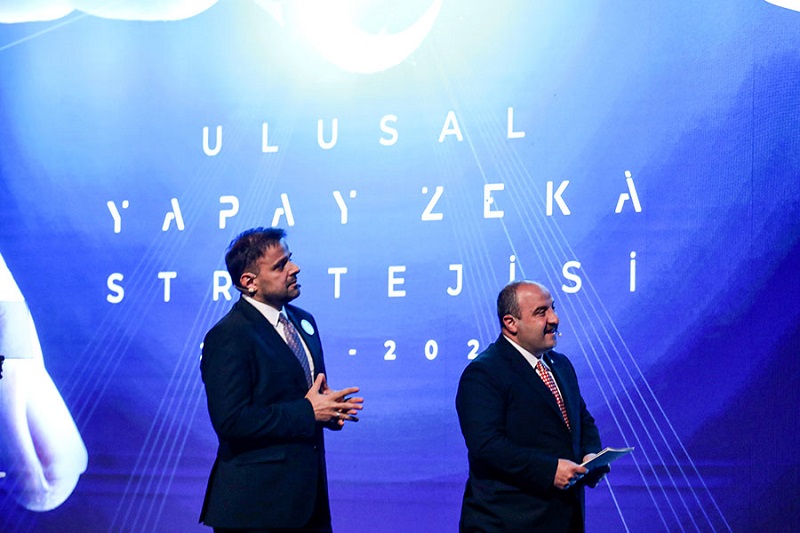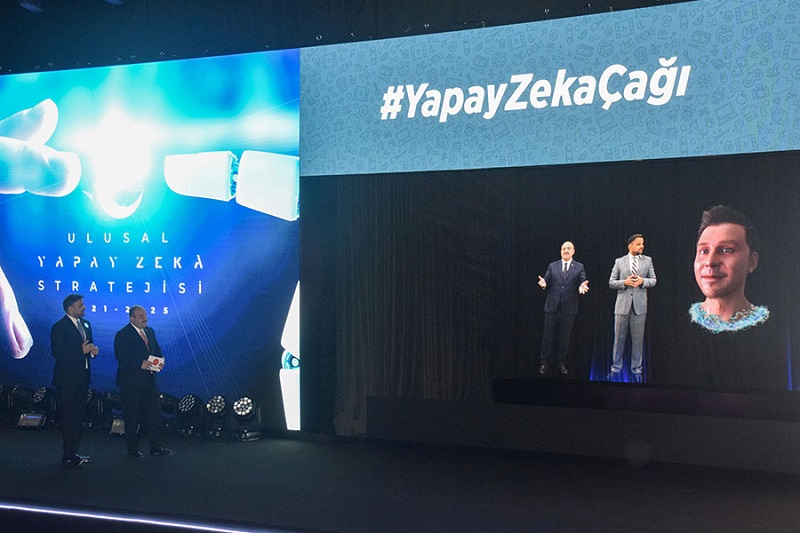Artificial intelligence is the cornerstone of development strategies


Turkey took its place among the countries that published the artificial intelligence strategy. Turkey’s first ‘National Artificial Intelligence Strategy’, prepared by the Presidency of the Digital Transformation Office and the Ministry of Industry and Technology, to guide artificial intelligence studies in a 5-year period; was introduced to the public at the introductory meeting held on August 24 at Informatics Valley. The participants of the meeting where the informatics ecosystem meets were Presidential Digital Transformation Office President Dr. Ali Taha Koç and Industry and Technology Minister Mustafa Varank. Emphasizing the importance of qualified human resources in realizing the goals in the field of artificial intelligence, Varank said: “We aim to reach at least 50 thousand-employment in the field of artificial intelligence in 2025.” He noted that the 2021-2025 National Artificial Intelligence Strategy is being prepared and underlined that they will primarily create a public artificial intelligence ecosystem and technical infrastructure.
Minister Varank stated in his speech that the application areas of artificial intelligence technologies are increasing day by day and added: “It is predicted that artificial intelligence technologies will have a greater impact on the global economy than the internet revolution. The digitalization process, which has already been experienced at great speed, has accelerated with the effect of the Covid-19 pandemic. The social distance restrictions, which were enforced in this process, increased the use of communication and artificial intelligence applications.”


‘Corporate competence’, ‘governance’ and ‘strategic compliance’ are of paramount importance
Noting that the ‘National Artificial Intelligence Strategy’ will be one of the cornerstones of development goals, Dr. Ali Taha Koç emphasized that another feature of the document is that it was prepared in coordination with high level artificial intelligence policies and strategies. Koç said: “The ‘Artificial Intelligence Technology Roadmap’, which is being prepared by the Presidential Science, Technology and Innovation Policy Board, also consists of the main lines of our strategy. The way to develop a healthy artificial intelligence ecosystem goes through the correct use of quality data, technical infrastructure and advanced skills. This is only possible by prioritizing institutional capacity, coordination and cooperation. From this point of view, we focused on ‘corporate competence’, ‘governance’ and ‘strategic compliance’ in our document. Artificial intelligence is a phenomenon that tries, learns and constantly updates itself. Thus, one of the main features of our strategy is that it has an exploratory approach. The socioeconomic benefits of artificial intelligence have created new areas of global competition and expanded the global sphere of influence of artificial intelligence. We have to increase our global competitiveness by using artificial intelligence effectively and efficiently.”


Artificial intelligence is the key to increasing productivity and improving business processes
Koç pointed out that artificial intelligence technologies caused significant changes in the employment market, while the need for physical skills in the labor market decreased, technological competencies and emotional skills came to the fore and the need for sectoral expertise and usage scenarios increased. Koç gave the following details in his speech: “This pressure of transformation requires businesses to improve their decision-making mechanisms and business processes based on data. In this sense, we see artificial intelligence as the key to increasing efficiency and improving business processes. Ethical principles are being developed by OECD, EU, G20 and UNESCO to guide artificial intelligence studies. As Turkey, we are the stakeholders of the ‘Reliable and Responsible Artificial Intelligence’ values and principles prepared by these organizations. This understanding lies at the heart of our ‘National Artificial Intelligence Strategy’. We said that we set the vision of our document as ‘Creating value on a global scale with an agile and sustainable artificial intelligence ecosystem for a prosperous Turkey’. There are 24 goals and 119 measures under our 6 strategic priorities to realize this vision.”
Venture capital funds focused on artificial intelligence will be activated
Koç continued to give information about the strategy and said: “Our first priority is our human capital, to train artificial intelligence experts and to increase employment in this field. First of all, we will support the employment of researchers and applicators. The number of new graduates in the field of artificial intelligence will increase. We will expand thematic programs for young people before higher education. Our second priority is to support research, entrepreneurship and innovation. We will activate artificial intelligence-focused venture capital funds and establish clustering and excellence centers where advanced R&D activities can be carried out. As the third priority; we will expand access to quality data and technical infrastructure. Administrative, legal and technical studies will be carried out on secure data sharing, and access to technical infrastructures required for artificial intelligence studies will be facilitated. Our fourth priority is to make arrangements to accelerate socioeconomic adjustment. We will make administrative and legal arrangements to adapt to the socioeconomic transformation and produce statistics to follow the dynamics of this transformation. Our fifth priority is to strengthen international cooperation. We will actively participate in reliable and responsible artificial intelligence studies carried out at the international level, carry out activities to initiate international projects in our country and support cooperation with international organizations. Our sixth priority is accelerating structural and workforce transformation. We will create a public artificial intelligence ecosystem and technical infrastructure. First, we start with the public. We will also create and test the trusted AI stamp. Training and certification programs will be carried out for new professions emerging with artificial intelligence.”
Actions can only be realized through cooperation Using
Koç expressed that: “The stakeholders of this document are the public, NGOs, private sector and universities. The effective implementation of the measures and actions we have put forward can only be achieved through cooperation. The implementation process of the document will be carried out by the ‘Guiding Committee’ chaired by our Vice President. In addition, we will establish an artificial intelligence ecosystem advisory group and action coordination group and form working groups with broad participation to ensure administrative and technical coordination. In line with our country’s policy priorities, we have set ambitious macro targets with our ‘National Artificial Intelligence Strategy’. Post-graduates in this field will increase to at least 10 thousand people. We will also be among the first 20 countries in international artificial intelligence indices. We will achieve this together as 84 million. The strategy document includes studies carried out with 40 public institutions, 26 academicians, 38 private sector organizations, 4 non-governmental organizations, 2 professional organizations and 4 international organizations. Global trends shaped by the paradigm shift that emerged with artificial intelligence in economic and social life were analyzed. The draft text, which was opened to the view of stakeholders in April, was later finalized.











